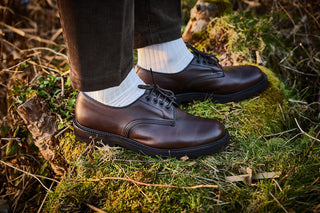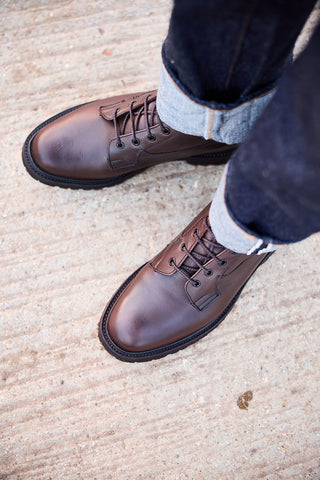
Our Commitment
SUSTAINABILTY POLICY
AND OPERATING PRINCIPLES
R.E.Tricker has an ongoing responsibility as a manufacturing company to manage environmentally related matters and to take proper care of the environment, in so far as it impacts on its business operations and other Company-related activities. These duties form an essential part of how we run and maintain our business. It also reflects our support for the principle of sustainable development
Northampton, situated in the heart of England, is a famous for its shoe industry, the history of which goes back hundreds of years with shoemakers attracted to the town due to its thriving tanning industry creating a cluster of skills and knowledge.
Brand Film https://www.youtube.com/channel/UCPc0r4OrKFca6gW1wGDnSjg
Our local partners are core for Tricker’s and this close relationship with them is a key of our success. We always try as much as possible to work on any new developments with our local and UK partners.
The Company is determined to successfully manage all of its operational activities which impact the environment in a responsible manner.
At Tricker’s, sustainability is woven into everything that we do. We have been working to develop the very best leathers for use in our Northampton-made footwear but it’s not just about the sustainability of our materials; it’s about social, economic, and ecological sustainability as well.
Repairable things have a future – those who give used things a second life avoid waste, save raw materials, and protect the environment and the climate
Social values
Here at Tricker’s, we take great pride that we are 100% made in Northampton, using components sourced in the county where possible - such as our lasts which are made by Springline - and employing local craftsmen and factory operatives from the county.
We believe in training our staff in a trade, teaching them skills which will benefit not only themselves but their community and the country overall. A skilled workforce is the backbone of our economy, and we are committed to ensuring that the skills and quality that Tricker’s is renowned for is passed down through generations of our staff.
- We are providing employment in the local community
- Committed to training to sustain important skills
- Use local suppliers
- Supporting apprentices through the Kickstart, Apprenticeship and QEST scheme
- We are proud to be a living wage employer https://www.livingwage.org.uk/
- Ensure that our supplier employees are fairly paid
- Practise an open management approach with a continuous direct link with all our staff.
- Health & Safety – use of external experts to ensure we are doing the right thing
- Staff welfare – Employee Assistance Programme
Economic
When you find shoes that you love, you’ll want to keep them for as long as possible, so we only produce shoes that are built to last. Conserving and repairing, rather than simply buying something new and replacing, is at the heart of our manufacturing process, and when you purchase a Tricker’s shoe you have footwear that will stay with you for a long time.
Almost all elements of Tricker’s footwear can be repaired or replaced, and our Goodyear Welt construction means that it’s easy for us to do
Environmental
The ingredients for a sustainable product should not only be harmless to the environment during production but ideally, also have a positive effect as well.
For our Olivvia Leather, the olive leaf extract is made from leaves that are a by-product of the food industry and are often burned. It is an entirely organic brew - it’s even edible - and therefore extremely clean. Finally, all of the waste from the process can be used as a natural fertiliser.
We also ensure that our shoes are easy to repair and renovate, meaning that fewer pairs contribute to landfill sites around the world. With fewer recycling centres around that can deal with shoe recycling, we must contribute to a greener future by providing other options.
Operating a circular economy
Linear consumption is reaching its limits. A circular economy has benefits that are operational as well as strategic, on both a micro- and macroeconomic level.
The last 150 years of industrial evolution have been dominated by a one-way or linear model of production and consumption in which goods are manufactured from raw materials, sold, used, and then discarded or incinerated as waste.
A circular economy is an industrial system undertaken here at Tricker’s, that is restorative or regenerative by intention and design. The economic benefit of transitioning to this new business model is now more important than ever.
Our shoes are made in a way that they can be disassembled and put back together and be just as good as they were at the very beginning.
We have bought second-hand machines which is another way to avoid buying new where possible
People feel trapped in this cycle of buying cheap disposable things because they don't feel like they can take that step. We all need to find a way of making really high quality locally made products that support good jobs in our communities and make it affordable to people.
Buy fewer things, buy good things, keep them and cherish them, repair them and that the solution
Making & Repairing Film https://www.youtube.com/watch?v=9XWl6P_reCU
Raw materials
We only work with a limited number of very reputable suppliers – all certified and with their own internal targets in term of waste and recycling.
We also consider the wider economic impact that our materials have. When producing from some renewable raw materials, it can often mean that it has a knock-on effect, and the good intentions are undone down the line.
Agricultural land used for sourcing materials may no longer be available for growing food, for example, so by using materials such as Olivvia leather which use ingredients that are already being produced anyway, it helps to lessen the negative economic impact and helps us build towards continued dedication to sustainable production processes.
All of our leather is a by-product if the meat industry. We ensure that the herds are sustainably managed and are not from pasture obtained by deforestation.
Modern leather manufacturing recycles over 270 million cow hides each year. These are a by-product of the food industry and without the ability of the leather industry to transform them into leather, over 7 million tonnes would go to landfill with huge environmental and biological impact. Leather makes a sustainable contribution to a society that needs to consume less, reuse more and a recycle everything.
Well-made leather lasts a long time and unlike most man-made, or synthetic materials it gets better with age, acquiring a depth of patina and wear pattern that is individual to the user - much like a favourite pair of jeans.
Wet-Green, a company based near Stuttgart in Germany have developed a very special tanning brew using the leaves of Olives; this brew has been patented and is named Olivenleder® (Olive Leather in English) It is an entirely organic brew (edible in fact) and therefore extremely clean. All waste can be used as a natural fertiliser including the leaves and leather shavings. What's more, Olive leaves are entirely sustainable, a waste product of the Olive Oil industry, millions of which fall during the Olive harvest and are traditionally burnt.
Tricker’s have been working alongside Wet-Green and world-renowned German Tannery, Weinheimer, to develop the very best leathers, those suitable to be used on Tricker’s shoes. These leathers have been named Olivvia. You will have seen our collection of Olivvia shoes continually grow since 2017 as we continue to breakthrough ensuring maximum quality, colour and substance is there.
Tricker’s continue to lead in the traceability and sustainability of the materials used to make our shoes and boots.
The advances we make with Olivvia leather using Olivenleder® are extremely encouraging - it is remarkable something so beautiful can be made entirely using waste matter from the food industry.
One key component used for the bottom of our footwear is a granulated cork paste. Using cork has several advantages because of its flexibility, durability, and comfort for the wearer. Furthermore, it is, of course, environmentally friendly. No other potential man-made alternative product can compete with this renewable material.
Our cotton is sourced with European cotton, all our laces are made entirely in Europe from one unique very reputable and certified supplier.
All cardboard in our boxes is made from recycled paper with any virgin fibre being FSC/PEFC certified.
Process
There would no production of our footwear without our skilled craftsmen and women. Their work and commitment make things possible and explain our long history.
Leather is the main element of the footwear, the most visible and iconic one. We consume this expensive and natural resource very carefully, always focusing on maximising its usage and reducing the waste.
Our operatives cutting the leather, called clickers due to the sound made by the knife blade rattling against the brass edges of the patterns overlaid onto the skin, are very skilled people whose task is to cut the leather to the patterns.
But it’s not as simple as it seems. They need to have a perfect understanding of the leather – its structure, its natural defects (most of the times hidden) – to avoid any problems on the finished product while placing the patterns on the skins in the optimum way (a core part of their skills) to optimise the usage of the leather.
Our production requires us as well to use some machines. These highly technical and complex machines are key to ensure a constant production at the right quality level.
Although we embrace modernity, the vast majority of our machines are traditional, long lasting machines that we have had for decades. They are carefully maintained and repaired by our in-house engineer.
Waste
Tricker’s actively apply The Waste Hierarchy to the way we operate.
Prevent
We maintain existing machines to keep them running for many years to avoid the need to buy new machines with the associated embedded carbon.
Our skilled leather cutters ensure that each hide is used to maximum effect. Offcuts are weighted to monitor this activity.
Re-use
We have bought second-hand machines which is another way to avoid buying new where possible.
Our shoes are designed to be repaired so become an enduring product rather than a throw-away fast-fashion item.
Offcuts of leather are passed to third parties to make into smaller leather products.
Waste plastic sheet and cardboard are used to protect the shoes during the production process
Recycle
Most of our recycling is cardboard packaging from our suppliers. We ensure that as much of the content is recycled and that any virgin fibre is FSC/PEFC-certified
We have entered into contract with our waste partner with a view to recycling as much as possible.
Our waste partner further sorts all general waste with a view to recycling more than what is economical to do on our premises. The current overall recycling rate is about 65%.
Recovery
Our waste management partner converts all non-recyclable waste into refuse-derived fuel, meaning Tricker’s achieve zero waste to landfill.
Opportunities we are pursuing include:
Expansion of the repair facility which has seen rapid growth in recent years
Closer, more accurate segregation and monitoring of our waste streams to ensure as much as possible is recycled.
Investigate re-usable packaging for the delivery of supplied products to see if this is more beneficial than using cardboard.
All waste is measured to help with continuous improvement in diverting from landfill . Recyclable waste is segregated.
Traditional stitching methods mean fewer adhesives and solvents are used
Energy efficiency
Tricker’s have been monitoring our energy consumption for many years. The factory is a listed building so there are restrictions on actions we can take on the fabric. We constantly analyse the data and make improvements where beneficial and feasible, such as investing in energy-efficient equipment and fittings and targeting waste arising from behavioural actions. We are committed to improving energy efficiency and obtaining our energy from renewable sources wherever possible.
Water
We only use water for cleaning and sanitation. We do not use water in any of our processes, so our consumption is very low. Water consumption is monitored to ensure there is no unplanned waste, such as pipe leaks.
Repairs
Founded in 1829, Tricker’s is proudly the oldest established shoemaker in Britain. Still owned by its founding family, the brand’s commitment to making shoes and boots of outstanding quality remains wholeheartedly consistent. Tricker’s footwear is made entirely from start to finish at its Northampton factory and, whilst manufacturing processes have changed over time, its craftspeople continue to follow the traditional techniques.
There are 250 individual processes in the making of a pair of Tricker’s country boots and they each take a total of eight weeks to manufacture.
The Goodyear-Welt construction of Tricker’s shoes provides the best in comfort, support, and wearability. This construction is designed to allow rebuilding, but the process requires the utmost in skilful craftsmanship and shoemaking experience.
We are proud of our factory repair service. Your treasured Tricker’s shoes will receive an expert rebuilding including all necessary repairs, using the original materials and carefully hand worked on the original wooden lasts.
Tricker’s repairs department regularly restores shoes and boots that are more than 20 years old. We can almost always bring them back to life.
Provided the upper is still in one piece, we can attach it to a brand-new sole and welt so that it is as good as new (although many of our customers are very particular in asking us not to restore the uppers too much).
When you damage a pair of shoes, it can be easy to think that they are beyond salvation, but this is often not the case. Our team of experienced shoemakers can help reinvigorate worn or damaged Tricker’s footwear
Shoes with Goodyear welt construction in particular are relatively easy to repair, and the beauty is that the cost of doing so is often a fraction of that of a new pair of shoes of similar quality.
When the time comes, and your beloved Tricker’s have seen better days, you can send them back to us and we'll restore them to their former glory (or bring them back to life).
When your favourite pair has been worn to the point that your soles start getting noticeably thin and soft spots, don’t even think of throwing them away – it is simply time for an overhaul.
While most shoes sold today are not made to last for much more than a season or two, proper Northampton welted constructions can normally be re-soled a number of times, giving them the potential to last for decades.
The shoes will be stripped down, re-welted, re-corked, re-soled and re-heeled on the original last, and will come back polished and with a new leather sock.
R.E. Tricker Ltd. is therefore committed to achieving the following objectives
We will:
- As a basic aim, comply with all environmental laws and regulations applicable to each element of our business process.
- Engage with regulatory agencies, Company advisers, insurance auditors and other interested parties, as necessary in the implementation of effective environmental policies and strategies. Where no policy exists, we will develop our own guidelines.
- Take account of our environmental responsibility and accountability as a factor in our business strategies, planning and decision making.
- Maintain an environmental management system, review the related impacts of our ongoing activities, set achievable and sustainable performance targets.
- Require and expect our suppliers to cooperate with us in achieving our environmental objectives. For our key suppliers of goods and services, environmental standards and operating requirements are, and will remain, an integral component in new contact deliberations and for all contract review and renewal discussions.
- Monitor our business travel and consider alternatives wherever practical, i.e., teleconferencing and/or video-conferencing.
- Adopt effective procedures to minimise waste production and to promote recycling of unused product and packaging, wherever practicable.
- Evaluate our products and any constituent chemicals used in their manufacture in order to ensure there is minimal potential for pollution throughout the life cycle of the products.
- Prevent discharges of any emissions to air and water.
- Monitor our environmental performance on a programmed basis and review regularly to generate any changes required to ensure continual improvement.
- Introduce risk control initiatives, audit these processes in order to minimise the potential for accident and emergency situations and ensure that there are effective contingency plans in place for any loss of normal control.
- Establish objectives and targets, based upon this policy and from an analysis of the Company's current environmental performance, to promote continual environmental management improvements.
Martin Mason
Managing Director


